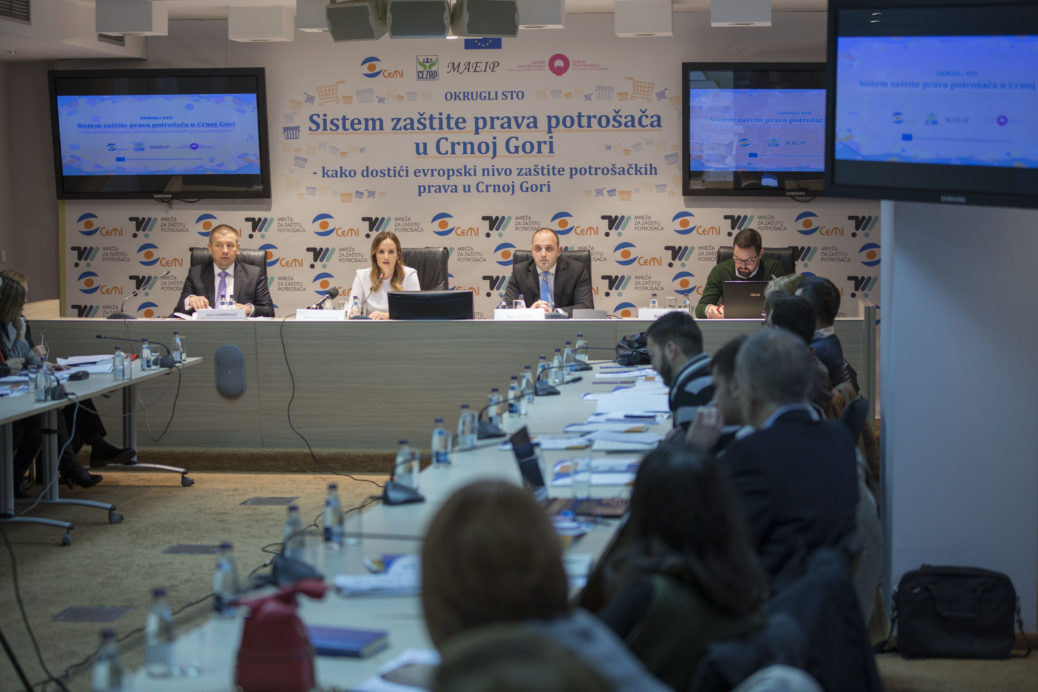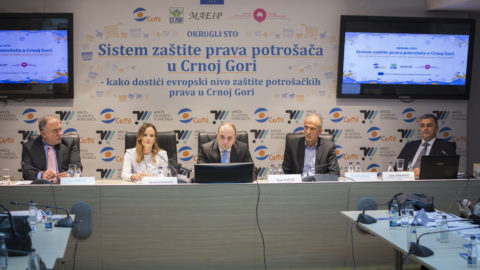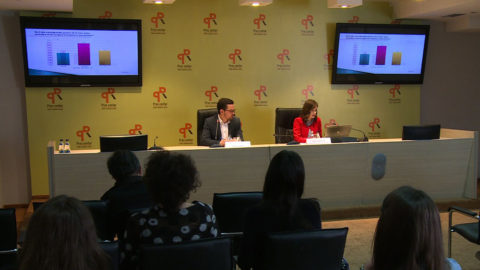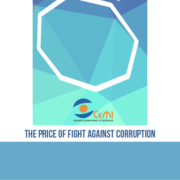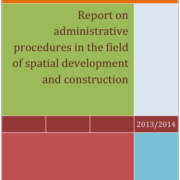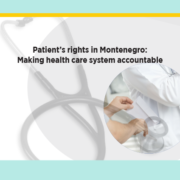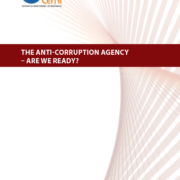The main characteristics of Montenegrin consumers are inactivity and lack of information, and in certain part unprotectedness, because of it is necessary to work on raising awareness and strengthening administrative capacities for implementation of the Law which regulates that area.
That is rated in the first part of round table „ The system of protection of consumers rights in Montenegro – how to reach European level of protection of consumers rights in Montenegro?„ which CeMI organized within the project „Capacity building of the civil society organisations and the sistem of protection of consumers in Montenegro – PROTECT ME, which is financed by EU.
The excutive director of CeMI and the author of the Study of practical public publicy „The system of protection of consumers in Montenegro – how to reach European level of protection of consumers rights in Montenegro“ , Nikoleta Đukanović, said that it is necessary to continue working on capacity building of the policy of protection of the cosumers, speaking of the legislative part and strategic framework, and on the other hand, as she said, it is necessary to raise awareness of the consumers and building administrative capacities for implementation of the Law of protection of consumers.
“We think that the main problem is conscience, or rather lack of information and citizens ignorance about their consumers rights”, as Đukanović said.
Speaking of trade, as she explained, the level of the consumers protection is on unsatisfactory level.
“In the past several years, a tendency of growth appeals by consumers is noticed, not only because the consumers are more conscience and informed about their rights, but on the other hand, market of goods and services is constantly expanding. The merchants are, seems to us, dominantly focused on achievement a bigger profit, which is the reason of very common consumer refusal, when they want to achieve their rights”, as Đukanović said.
Also, she adds that the business sector gives resistance, or rather disables the consumers to achieve their rules „ regardless of big number of cases of abuse. “
Đukanović said that it is necessary to change and amend the Law of protection of the consumers, whose, as she said, the main lack because it is nowhere specified that rights based on purchase, they can achieve without fiscal bill.
„ It leaves enough space for abuse implementation of legal obligations in progress of reclamation and the only proof for the merchants about trading is fiskal bill. The second problem is, regarding of the articles of the Law, on which we define the deadline for the merchant for non-conformity of goods, it is unclear on which kind of unused goods is meant, because, for example : used car, furniture – cannot have one year for reclamation, like clothes, shoes etc. „, Đukanović explained.
She considers that, speaking of electronic trade, it is very important to inform the business sector about obligations and providing information to the consumers about security online purchase.
„For development of electronic trade in Montenegro, significant precondition is removing consumer distrust according to this type of bussines, raising public consience about practicality with improvement of the quality of access.“ , Đukanović explained.
As she said, Montenegrin consumers are not sufficiently informed speaking of security of food and its quality.
„How it is delicated question in the part of the protection of consumers, in the last several years, frequently cases of withdrawal series of dangerous products from traffic show it to us. In this area, the most common appeal of the consumers are related on the bad quality of the products, non-hygienic conditions in stores, inadequate storage of the products, on expirations dates etc.“ , Đukanović said.
The main characteristic of the Montenegrin consumer is, as she said, inactivity and lack of information, and in one part – unprotectedness.
„Usually, the citizens provide passive resistance, because, it is very often situation when they do not react in concrete cases, when it comes to violation of their rights. The citizens concience about consumer rights is on a bad level, and that concience depends from region to region. The citizen from central and south region of Montenegro are very conscious about their consumers rights, but, the north region gives different impression“, Đukanović said.
Solving consumer slows out of the court, as she said, for Montenegrin citizens, through legal provisions, it is available almost ten years, but, as she pointed, Arbitration board is not in function since May last year.
„In the time when The Board was in function, it was a poor citizens interest for solving slows, through this mehanism. According to the available data from 2015, it was 15 requests sent to The Board. The main reason for poor interest is ignoring this mehanism“, Đukanović said.
Head of the Legal Department of CeMi and the author of the Study of practical public publicy „The system of protection of consumers in Montenegro – how to reach European level of protection of consumers rights in Montenegro“, Bojan Božović, said that protection of the consumers in Montenegro doesn’t have a long tradition, but also, he said that it doesn’t have a long tradition in Europe, because, it is the product of 20th century.
“We must signalize that some segments of the protection of consumers in Montenegro, especially normative, are on one high protection level, if we compare that with some other countries in EU. But, we should not look to the ones which are a few steps behind us, already strive to the levels, which exists in the most development countries”, Božović said.
He said that it’s possible to protect the consumers, altough everything is not regulated through legal norms and regulations, if, as he said, courts, out of courts and the other institutions have conscience that protection of the consumers are one of the priorities into modern concepts of legal heritage of Europe and Montenegro.
„The European Court wants to everyone must know that the economy is necessary for development of every state, but it must’nt forget protection of individuals in view of respect consumers rights and that the main protection segment of that rights is raising the level of consciousness and level of knowledge of citizens“, Božović said.
According to his words, the possibility for raising collective lawsuits should present very powerful remedy for protection of consumers.
„We are not sure that it is good as it should be. l think that with joint engagement, we should come to the high level of protection of the consumers and believe that we will achieve in coming period“, Božović said.
The President of The Directorate for national brend development and protection of consumers in Ministry of Economy, Jovo Rabrenović, agrees to existence of good legal framework and he thinks that, in protection of customers area, the main problem is education and activity of the consumers.
„ There is insufficient activity of the consumers and insufficient interest in filing an objection, for informing about their own rights. Very often we have a situation when the consumers are complaining about the problems, and, when we ask them, do they fill an objection, they said – no, and ask „can we do it for them“. The consumer, if he thinks that his right is violated, must fill an object by himself“, Rabrenović explained.
He thinks that the role of NVO is very important and also, NVO daily and periodically, in communication with consumers on the field, as he said, should contribute to understanding consumers rights and how to react in different situation.
Chief Market Inspector in Administartion for Inspection Affairs , Nada Đurđić, said that we need educative inspectors and appropriate administrative capacities, which should apply regulations, following the supervisor procedure.
„In that direction, we should provide, not only the number of inspectors for the problems that we see in this part, we need more, including specialist knowledge for special areas and that education, which we should provide“, Đurđić said.
When we talk about prices, the merchants make a lot of violations.
„We had 8, 500 controls in this area, which indicates that our merchants don’t respect the regulations, and specially that is about discounts. Our consumers get the information which are inaccurate and misleading“, Đurđić said.
She pointed that a lot of problems and irregularities exists according to information about products.
Head of Sector for Economic development in Chamber of Economy of Montenegro, Nina Drakić, said that we need balance between the rights of customers and merchants, so that doesn’t go against the interest on one or the other side.
“Surely, the target of every economic subject is to make a profit, so that doesn’t go against the interest on consumers or to threaten someone else rights. Because of that, I would send a message that all of us through joint treatment should provide that the system of protection of consumers in Montenegro should be on the adequate level and in all of that activities we should include economic subjects just to hear their voice “, Drakić said.
The executive director of The Center for protection of consumers, Olga Nikčević, said that in the last two years it is almost impossible that consumer achieves his own rights.
“It is the Sizifs’ job. It is not important for the customer to have the knowledge, because, our examples says that we have the existence of the customers which know how to achieve their rights, but they should not achieve it – with our support, and with support from some institutions”, Nikčević said.
She thinks that the state doesn’t keep on about customers and she said that in our country we import “one and all”.
“Now, when we control, 35 tons of lemon is returned from the border, thank God it has been returned, and we can imagine how much things passed the border, and we did not return that. I am sure In that, and l don’t want to talk about wine harvest, about we can talk ten years”, Nikčević said.
The project “Building capacity of the Civic Society Organization and the system of protection of consumers in Montenegro – PROTECT ME, CeMI springs in partnership with The Centre for Protection of Consumers , Queer Montenegro and MAEIP.


 Montenegrin
Montenegrin